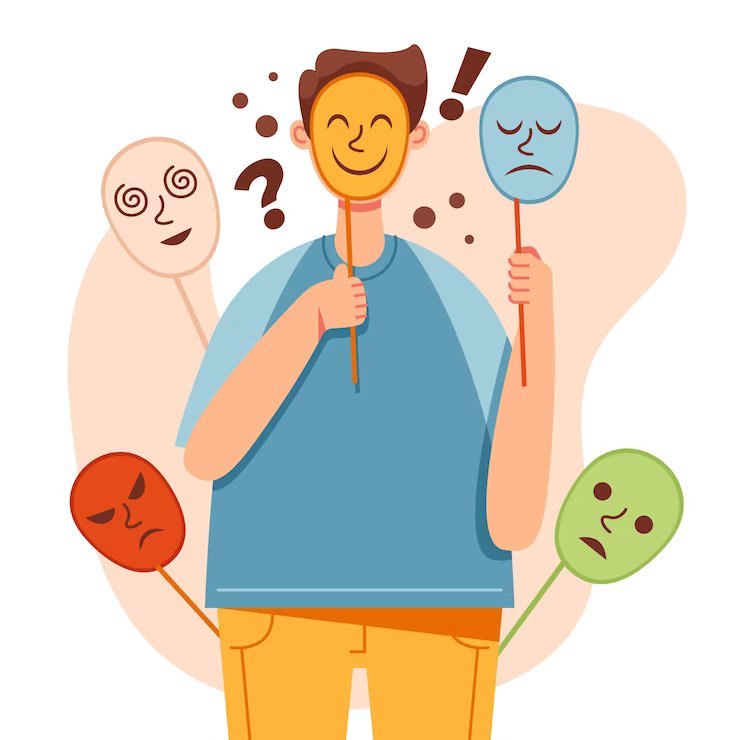An individual with borderline personality disorder (BPD) has altered thoughts and feelings regarding both her and other people. Common signs of BPD include the following:
1. Intense fear of abandonment or rejection.
2. Unstable and intense relationships
3. Impulsive and risky behavior, such as substance abuse or reckless driving
4. Unstable self-image or sense of self
5. Self-harm behaviors or suicidal ideation
6. Mood swings and emotional dysregulation
7. Chronic feelings of emptiness
8. Paranoia or dissociation
BPD can be a challenging condition to manage, but it is treatable with therapy and medication. Dialectical Behavior Therapy (DBT) is a common treatment for BPD that focuses on teaching skills to help manage intense emotions and improve relationships. Medications such as mood stabilizers or antidepressants may also be used in conjunction with therapy.
If you or someone you know is experiencing symptoms of BPD, it’s important to seek professional help from a mental health provider who specializes in treating this condition. With appropriate treatment, many people with BPD can manage their symptoms and lead fulfilling lives.
Treatment for borderline personality Disorder
Borderline Personality Disorder (BPD) is a complex condition that can be challenging to treat. There are several treatment options available, and the most effective approach may vary depending on the individual’s specific needs and preferences. Here are some common treatments for BPD:
1. Psychotherapy: Psychotherapy, particularly dialectical behavior therapy (DBT), is considered the gold standard treatment for BPD. DBT is a type of cognitive-behavioral therapy that focuses on helping individuals regulate their emotions, improve their interpersonal skills, and develop distress tolerance strategies. Other types of therapy that may be helpful for BPD include schema-focused therapy, mentalization-based therapy, and transference-focused therapy.
2. Medications: Medications can be used to treat specific symptoms associated with BPD, such as depression, anxiety, and impulsivity. Antidepressants and antipsychotic medications may be prescribed by a psychiatrist to help manage these symptoms.
3. Self-help strategies: Self-help strategies can be an essential part of BPD treatment. These may include mindfulness meditation, relaxation techniques, healthy lifestyle changes, and self-care activities that promote emotional regulation and overall well-being.
4. Support groups: Support groups can provide a sense of community and belonging for individuals with BPD. Groups such as Dialectical Behavior Therapy (DBT) skills groups or peer support groups can offer a safe space for individuals to share their experiences and learn coping strategies from others.
Borderline personality BPD can be a chronic condition, and treatment may be ongoing. It may take time and effort to find the right combination of treatments that work for everyone, but with persistence and the right support, individuals with BPD can learn to better their quality of life by controlling their symptoms.
Which part of the brain is affected by borderline personality disorder?
The exact causes of borderline personality disorder (BPD) are not fully understood, but research suggests that there may be a combination of genetic, environmental, and neurobiological factors involved. Studies have shown that individuals with BPD may have structural and functional abnormalities in certain areas of the brain.
One area of the brain that has been implicated in BPD is the prefrontal cortex, which is responsible for executive functioning, decision-making, and emotional regulation. Individuals with BPD have been found to have reduced gray matter volume in the prefrontal cortex, which may contribute to difficulties in impulse control and emotional regulation.
Another area of the brain that may be affected by BPD is the amygdala, which is involved in emotional processing and the regulation of fear and anxiety. Studies have found that individuals with BPD may have increased activity in the amygdala in response to emotional stimuli, which may contribute to their heightened emotional reactivity and difficulty regulating emotions.
Additionally, abnormalities in the serotonin system have been implicated in BPD. A neurotransmitter called serotonin is involved in controlling aggression, impulsivity, and mood. Individuals with BPD have been found to have lower levels of serotonin and abnormalities in serotonin receptors, which may contribute to their symptoms.
It’s important to note that while these brain abnormalities may be associated with BPD, they are not unique to the disorder and may also be present in other psychiatric conditions. Further research is needed to fully understand the neurobiological underpinnings of BPD.
What are some self-care activities that can help with BPD?
Self-care activities can be an essential part of managing BPD symptoms.
1. Mindfulness and meditation: Practicing mindfulness and meditation can help individuals with BPD become more aware of their emotions and thoughts and learn to observe them without judgment. This can help reduce emotional reactivity and promote a sense of calm.
2. Exercise: Regular exercise can help reduce stress, improve mood, and increase self-esteem. Engaging in physical activities such as yoga, running, or weightlifting can also help regulate emotions and promote a sense of well-being.
3. Creative expression: Engaging in creative activities such as painting, writing, or music can be a helpful way to express emotions and reduce stress. Creative expression can also promote a sense of accomplishment and self-worth.
4. Connecting with others: Building and maintaining supportive relationships with family, friends, or a therapist can be a crucial part of self-care for individuals with BPD. Connecting with others can provide a sense of belonging and help reduce feelings of isolation.
5. Self-compassion: Practicing self-compassion involves treating oneself with kindness and understanding, rather than self-criticism and judgment. This can involve acknowledging and accepting one’s emotions and limitations, and practicing self-care activities that promote well-being.
Self-care strategies alone may not be enough to manage BPD symptoms, and individuals with BPD may benefit from additional treatment and support from a mental health professional. However, incorporating self-care activities into one’s daily routine can be a helpful way to promote emotional regulation and overall well-being.
If you’re looking for “Online counselling“ TalktoAngel can connect you with the best-trained professionals who offer “Best psychologist in india.”

